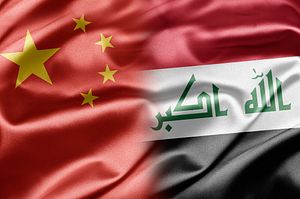The security situation in Iraq is deteriorating fast, as militants affiliated with the Islamic State in Iraq and Syria (ISIS) boast of massacring Iraqi security forces. The extremist Sunni group has seized control of Mosul, the second-largest city in Iraq and ISIS forces are moving south toward Baghdad. While much of the focus has been on the U.S. response to the violence, China too has major interests at stake in seeing the crisis brought to a swift end.
The crisis in Iraq is one more reminder that China’s security concerns have grown along with its global investments. In 2003, China strongly condemned the U.S. invasion of Iraq, but showed no inclination to get involved one way or the other. Over 10 years later, though, China’s interests in Iraq make it harder for Beijing to sit on the sidelines.
China has taken advantage of the opportunity afforded by Iraqi rebuilding to help meet China’s growing energy needs. China buys 1.5 million barrels of Iraqi oil each day, representing almost half of Iraq’s total oil output of 3.4 million barrels a day. To reap those rewards, China has invested billions in Iraq, and hundreds of Chinese workers have accompanied the money to work in the Middle Eastern country. The economic benefits China has reaped in Iraq led some commentators, like The Atlantic’s Matt Schiavenza, to claim that China has “won the Iraq War.”
At the time, analysts theorized that China’s increased interests in Iraq would help provide a stabilizing influence. “Geopolitically it develops close links between China and Iraq,” former State Department official David Goldwyn told the New York Times in 2013. China has “a great stake in assuring the continuity of the regime that facilitates their investment,” he added. Now those predictions are put to the test: as sectarian Sunni-Shiite violence threatens to tear Iraq apart, Beijing must decide how to respond.
As Forbes notes, Iraq’s oil reserves are not immediately at risk. So far oil production has been largely unaffected by the violence, as most of Iraq’s oil fields are located in southern Iraq while the conflict remains centered in the north. Most of the northern oil fields are located in Kurdish areas, which have also been largely spared in the current fighting. While the threat of civil war is obviously concerning to Beijing, the violence is not yet a major threat to China’s interests in Iraq.
However, we shouldn’t assume that China’s only interest in Iraq is keeping the oil flowing. Indeed, China’s security concerns are more and more tied up with stemming the growing influence of terrorist groups. Beijing sees a connection between global terror networks and domestic terrorism by Xinjiang militants, and thus China is invested in global anti-terrorism efforts. China remains especially concerned about the fate of Afghanistan after the U.S. drawdown, and Iraq’s fall is viewed as potential foreshadowing for Afghanistan’s fate.
An opinion piece in People’s Daily by “Zhong Sheng” (a pseudonym that represents a more or less official view) notes the worsening security situation in Iraq and across the Middle East as religious extremists grow bolder. The article attributes this situation to a failure of U.S. policy, using language that could just as easily be applied to Afghanistan as to Iraq. “America’s willful attempts to push forward democracy collapses at the first blow,” the article reads, noting that the U.S. is trying to plant democracy in “unsuitable soil.” However, while the article makes it clear that China has no taste for U.S.-style intervention in the Middle East, it does not offer an alternative path for addressing the problems that currently exist.
Government officials have been similarly vague. Foreign Ministry spokesperson Hua Chunying said that China is following the situation in Iraq closely. Naturally, Beijing’s paramount concern is for the safety of Chinese citizens in Iraq, especially after the kidnapping of staff from Turkey’s consulate in Mosul. Hua said that China’s embassy in Iraq has asked for Baghdad “to take concrete measures to ensure the security of Chinese citizens.” She also held out hope for Chinese assistance, saying “We are ready to continue with our help as our capacity allows.” But there was little indication of what form that “help” might take.
China has recently gotten its feet wet in the field of arbitration, helping to mediate between rival parties in South Sudan’s civil conflict, but it’s unlikely Beijing will take a similar approach here. For one thing, the conflict in Iraq reflects the sectarian tensions that divide much of the Middle East. China is unlikely to want to get directly involved in what is largely a Sunni-Shiite clash. In addition, as Xinhua noted, the Arab League has criticized the idea of foreign interference in the Iraq crisis, even as it condemned the terrorist attacks. Regional organizations like the Arab League play a major role in determining China’s reaction to regional crises. Plus, in this case the Arab League position is similar to China’s: denounce outside interference while calling for “a comprehensive and earnest dialogue to confront the threats that endanger the security, stability and unity of Iraq.”
As China’s global presence continues to expand, regional crises will have more and more of a direct impact on Chinese interests. The violence in Iraq poses a challenge not just to China’s oil interests, but to China’s general foreign policy principles. At what point will Chinese interests begin to outweigh its principle of non-interference in others’ affairs? The South Sudan crisis posed one such challenge; the Iraq crisis may prove even trickier for Beijing to handle.

































